

More than 1,700 European MOOCs listed in the new scoreboard. MOOCs in Europe by Michael Gaebel (EUA) Does Europe need its own Mooc? While Moocs (massive open online courses) are on the rise in the US, little has happened in the rest of the world, with the exception of Futurelearn, the Open University partnership consisting of 17 UK universities, as well as the Berlin-based iversity.
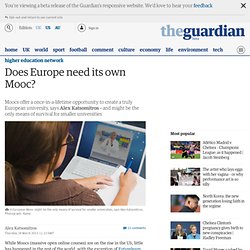
At European Union level, there have been reports about talks at the European Commission, but little action has been taken so far. In May 2012, WiredAcademic reported that the EU's Erasmus programme might soon go online – a good start if we want to see the equivalent of Coursera on this side of the Atlantic. But this does not go far enough. Higher education is one of the few policy areas where European unification is seen positively by most stakeholders, despite the occasional problems caused by the Bologna process. The creation of the European Higher Education Area (EHEA) has benefited most institutions by enabling them to provide comparable and compatible qualifications and compete at an international level. Why does Europe need a Mooc?
Partipants in European MOOCs Workshop 2013. European MOOCs in Global Context Workshop (19-20 June 2013 @ UW-Madison) Summary When: 19-20 June 2013 Wednesday 19 June, 5:00-6:30 pm — Introductions and Keynote kickoff with George Siemens (open reception to follow 6:30-7:30 pm on 3rd floor Rooftop Terrace (Common Area on 1st floor in case of rain))Thursday 20 June, 8:30 am-3:45 pm, visiting speaker and panelist presentations.FINAL Detailed schedule available here (in PDF format)Where: UW-Madison Education Building (1000 Bascom Mall), Wisconsin Idea Room, 1st floorWhat are MOOCs?
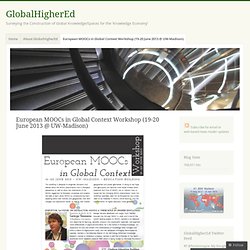
: See EDUCAUSE Learning Initiative’s 7 Things You Should Know About MOOCs (11 June 2013)Poster: Link here for full resolution version of above poster Massive Open Online Courses (MOOCs) were ‘invented’ in Canada in 2008, and then became transformed, institutionalized and scaled up via the efforts of people, universities, and firms, in the Boston and San Francisco Bay Area city-regions. The workshop kicks off with a 5:00 pm keynote talk on Wednesday 19 June by George Siemens (Athabasca University, Canada). Updated 14 June 2013. Expanding global landscape of MOOC platforms. In Brussels, yesterday, Androulla Vassiliou (European Commissioner for Education, Culture, Multilingualism and Youth) announced that the “first pan-European” MOOC platform will be launched on 25 April 2013.
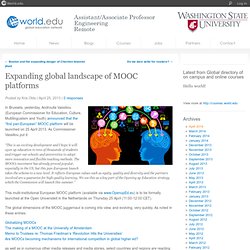
As Commissioner Vassiliou put it: “This is an exciting development and I hope it will open up education to tens of thousands of students and trigger our schools and universities to adopt more innovative and flexible teaching methods. The MOOCs movement has already proved popular, especially in the US, but this pan-European launch takes the scheme to a new level.
It reflects European values such as equity, quality and diversity and the partners involved are a guarantee for high-quality learning. We see this as a key part of the Opening up Education strategy which the Commission will launch this summer.” The global dimensions of the MOOC juggernaut is coming into view, and evolving, very quickly. Vassiliou welcomes launch of first pan-European university MOOCs (massive open online courses) European Commission Press release Brussels/Heerlen (Netherlands), 23 April 2013 Vassiliou welcomes launch of first pan-European university MOOCs (massive open online courses) Partners in 11 countries have joined forces to launch the first pan-European 'MOOCs' (Massive Open Online Courses) initiative, with the support of the European Commission.
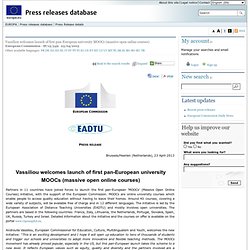
MOOCs are online university courses which enable people to access quality education without having to leave their homes. Androulla Vassiliou, European Commissioner for Education, Culture, Multilingualism and Youth, welcomes the new initiative: “This is an exciting development and I hope it will open up education to tens of thousands of students and trigger our schools and universities to adopt more innovative and flexible teaching methods. Professor Fred Mulder, chair of the EADTU task force on open education and UNESCO chair in Open Educational Resources, is leading the initiative. Background. Siemens - Connectivism. Editor’s Note: This is a milestone article that deserves careful study.
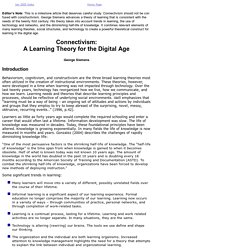
Connectivism should not be con fused with constructivism. George Siemens advances a theory of learning that is consistent with the needs of the twenty first century. His theory takes into account trends in learning, the use of technology and networks, and the diminishing half-life of knowledge.